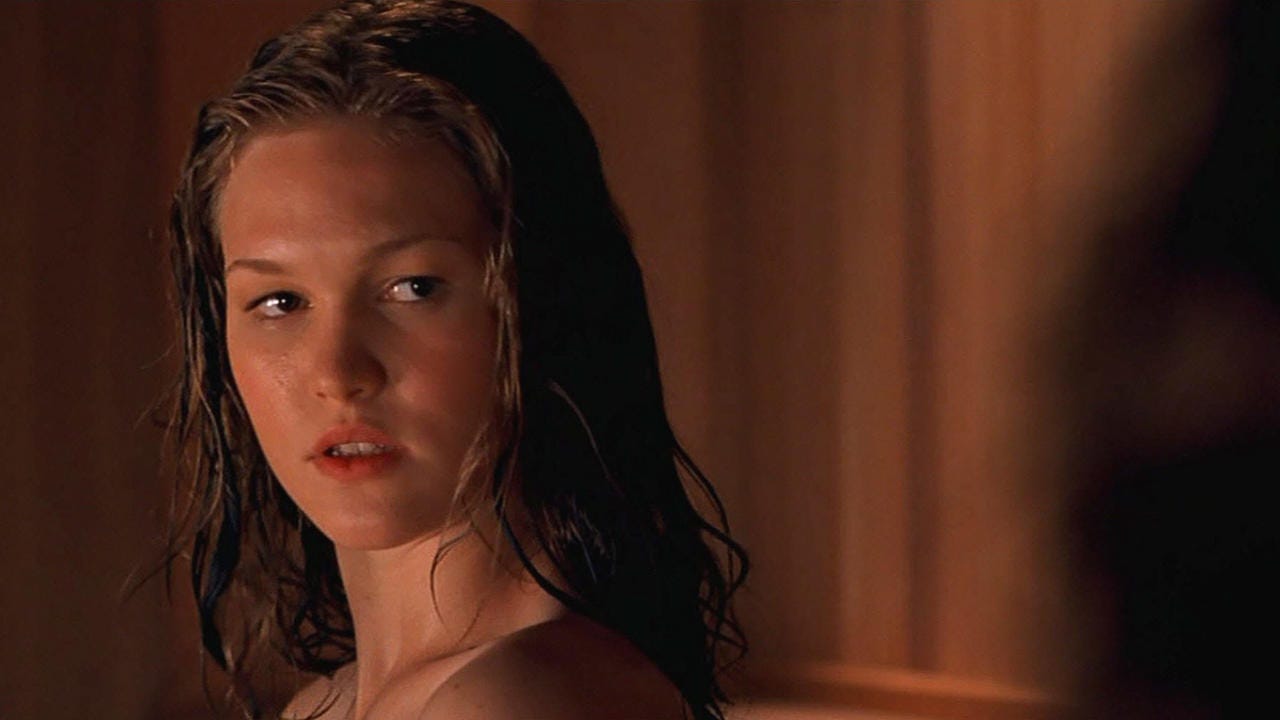the business of strangers
Film, 2001, 3 stars
Written and Directed: Patrick Stettner
I found wanted more than this film was giving me. When the characters were angry, I wanted them to be angrier. When sad, I wanted more anguish. When they were flirting, I wanted them to wind the sexuality up a notch. At every turn the script compromised and wasted the talents of two great actresses with obvious chemistry. Instead of being a great movie, it became just an OK movie with flashes of what could have been.
Before watching I had no idea the younger of the two women was bisexual. Making the character bisexual dramatically changed the meaning of the film and altered all my expectations. By putting in this one detail (that was badly explored and could easily have been left out) the writers opened up a whole new set of consequences that the film doesn't even come close to addressing. In fact, it is so seemingly unimportant a detail I wish the question of Paula's sexuality had not been explored. But hey, since they brought it up, I'm going to talk about it.
The Business of Strangers is set in a luxury hotel in one alcohol-fueled evening. Julie (Stockard Channing) is a middle-aged businesswoman who, after panicking that she was going to be fired, finds out that she has in fact been promoted to CEO. She looks around (metaphorically and literally) and finds she has no one to celebrate with. Earlier in the day she fired a junior employee, Paula (Julia Stiles) for being late to a corporate presentation. They meet up again in the bar of the hotel and strike up an uneasy conversation.
Despite their bad first impressions, the two women have an immediate and powerful connection, the boundaries of which the writers flirt with but never really test. Paula makes it clear that she is comfortable with her body and her sexuality. She styles herself as a rebel, someone who believes in experiences for their own sake. Julie is a confident, no bullshit, sexy older woman. There are moments — in the hotel gym, the pool, the sauna, the bar, in Julia's room — where sexual tension could have been built. Instead, the script offers mostly innuendo whose clumsy attempt at humour just works to diffuse the tension precisely when it should have been escalating.
Julie had, earlier in the day, invited a corporate headhunter named Nick to meet with her. Due to bad weather he is also trapped in the hotel overnight. In the bar, already half drunk and stoned on prescription meds, Julie introduces Nick to Paula. Paula has an intensely negative reaction to him because, as we find out, she knows that Nick was the man who raped her friend/lover in Boston several years before.
Julie is incensed and demands that they take some form of revenge. At first Paula says no, but when Nick conveniently presents himself again at the door of Julie's hotel room Paula invites him in and drugs him senseless. The rapist is now prone and helpless, and the two women have to decide what to do with him.
What they do starts out fairly innocent and extends to the almost-homicidal. At first Paula claims that her lover was raped, but Julie believes it was actually Paula who was raped. Paula admits this is true, and this sparks a round of angry confrontations dealing with trust. Now they've committed these acts against Nick, can these two women with control issues trust each other to keep the secret?
Of course, after having established Paula's bisexuality, Paula's "friend" ceases to exist, so then we're left to wonder what was the point to exploring Paula's sexuality at all? It appears this admission was meant to deepen and complicate the bond she has with Julie. However, when the issue arises again and Paula tries to emotionally blackmail Julie into kissing her, it isn't about sex at all, its about control, and we're left with the icky feeling that bisexuality is being linked with abuse of power.
Everything in the film is sucked into the pissing contest between these two women. As the night goes on their personalities and psychoses seem to merge. Paula thinks her openness and willingness to do anything will win the battle over Julie's pride and strength, but that isn't the case. As Paula strips layer after layer from Julie we realise that what Julie appears to be on the outside is precisely what she is on the inside. Surprise! Peeling away layers reveals nothing. She has moments where she lets go and seems to admit regret for her past, but her lust for power and control always comes back.
Paula strikes out at Julie with every weapon she has, and the fact that Julie meets her inch for inch, while never seeming for a second to be fooled by Paula's sexual overtures, just seems frustrating in the context of the film. I didn't feel like I learned anything from these two women, and I didn't feel like either of them had progressed at all either. No matter how tense it got, it always stopped just this side of safe. There are edges here, but they're all blunt.
The ending is all wrong. Paula could have been a real force. She could have been stronger, fiercer, really damaged. She could have been more aggressively sexual and turned Julie's whole world upside down. In the end she was made out to be little more than a petty thief and a liar, and Julie is left to ponder her narrow escape. She hasn't changed, she hasn't grown, she tries to look enigmatic but just comes off vaguely amused. Life goes back to normal and we realise that these strangers may as well have had no business at all.



